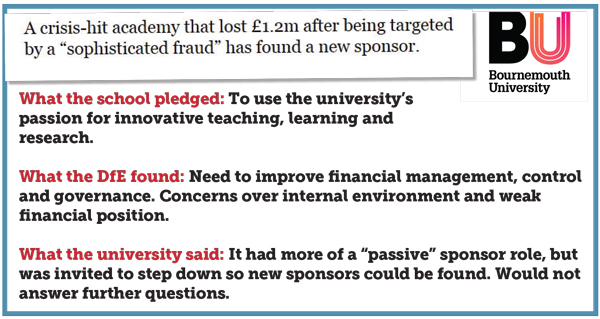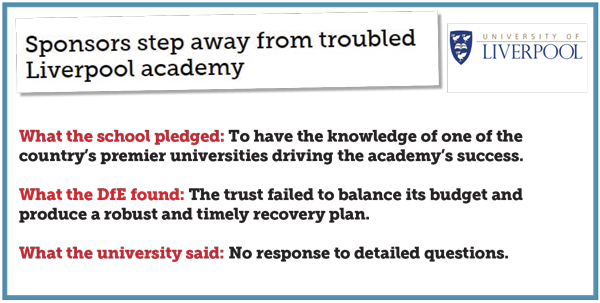Universities have withdrawn their sponsorship from at least four academies amid government concerns over the way they were being run. Analysis by Schools Week has found at least three of the 20 trusts facing financial notices to improve either include or have included university sponsors.
Two universities have pulled their sponsorship, while another faces having their governance restructured. The University of Chester Academy Trust (UCAT) has also ended its relationship with two schools.
Professor Becky Francis, an academies expert at King’s College London’s department of education and social justice, said: “Sometimes sponsors seem to underestimate the extent of their responsibilities and their need for dedicated involvement, especially when they are in a partner-sponsorship arrangement.”
St Aldhelm’s Academy in Poole, Dorset, opened in 2010, pledging to deliver “innovative teaching, learning and research” with the help of its sponsors, the University of Bournemouth and the Diocese of Salisbury. But the university ended its involvement in June last year after the school received a financial notice to improve in April, which raised concerns over its “management, control and governance”.
Similarly, the Enterprise South Liverpool Academy initially said that having the University of Liverpool as a sponsor meant it “had the knowledge of one of the country’s premier universities driving the academy’s success”. But the university was one of three sponsors that withdrew in January after a Department for Education (DfE) financial notice highlighted a £2.6m deficit at the school over the next three years.
The Bishop of Rochester Academy Trust, in Medway, was also issued with a financial notice to improve in November. Backed by Canterbury Church University, Medway Council and the Diocese of Rochester, it was ordered by the DfE to restructure its sponsorship arrangements.
UCAT, created by the University of Chester as a sister organisation, opened its first school in 2009, and now runs nine academies.
On opening it claimed the university’s expertise would “allow outstanding and uniquely tailored support” in schools. However, last year the trust was revealed as one of 14 barred by the DfE from taking over more schools. Three of its schools were highlighted for “unacceptably low” performance. The trust subsequently withdrew its co-sponsor role at the Winsford E-Act Academy and Ormskirk Bolingbroke Academy.
Despite repeated attempts, all three universities did not answer questions from Schools Week regarding their involvement in the schools (see graphic below).
There is no definitive list of the sponsors involved in each academy trust, so it is not possible to check if the examples are representative.
Universities have been praised for bringing “innovative partnerships” to the sector.
Natalie Evans, director of the New Schools Network, highlighted King’s College London and Exeter University for offering a specialist maths education to sixth formers, and the universities of Birmingham and Cambridge for setting up schools in partnership with teaching colleges.
She added: “The free schools policy has offered these universities a way to share their expertise and get more involved in education at a schools level.”
The University of Central London also turned around its school, opened in September 2012. Though an Ofsted inspection in May last year rated the academy as “requiring improvement” it performed well at A-level – getting 75 per cent of students to Russell Group universities.
Professor Francis added: “The Government needs to increase transparency and accountability for academy sponsorship. This should include greater rigour and openness in its processes for awarding and removing sponsorship. It should publish data on academy chains and their results across a range of measures.”





Your thoughts